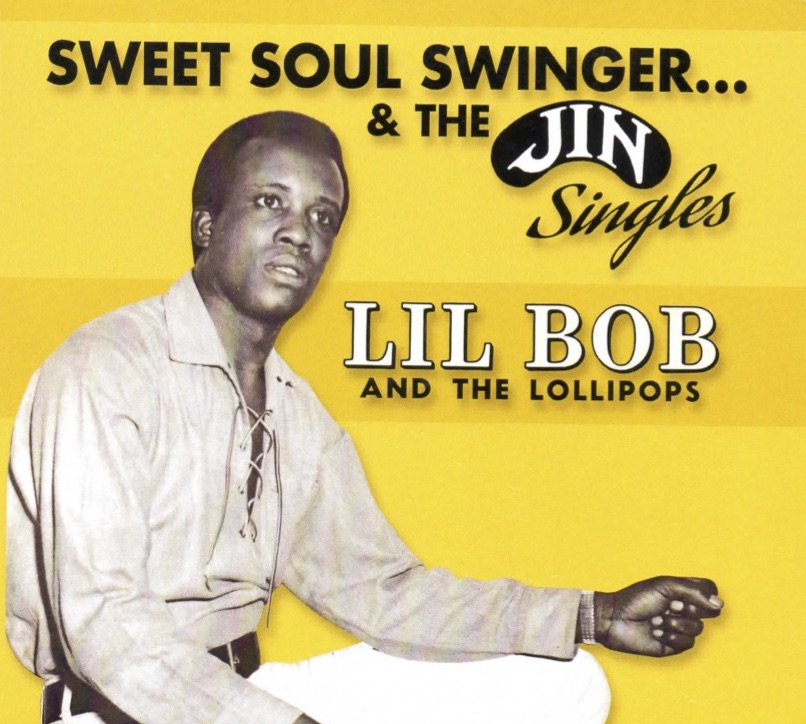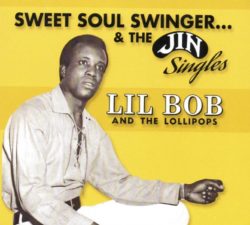Sound Advice
The Shimmering Mosaic of Louisiana Music
Ben Sandmel reviews new releases from Lloyd Price, Gregg Martinez, Sweet Cecilia and more
Published: March 8, 2018
Last Updated: December 6, 2018

Price has remained active ever since his heyday, recording and performing when he wishes to while also running a number of highly successful businesses outside the realm of music. His 2017 release This Is Rock And Roll (Double L Records) shows that Price remains a consistently strong and convincing singer in his eighties, despite lacking the vocal range of his youth. Rather than attempting a retro reprise of his ’50s hits, Price’s accompaniment here leans towards a slick, contemporary show-band sound that one might hear at a casino. Many of the songs are similarly contemporary, and some of them give Price much better material to work with than others. Price also celebrates his New Orleans roots with interpretations of two Fats Domino hits (“I’m Walking” and “Blueberry Hill”). With the recent death of Fats Domino, and the loss of Allen Toussaint in 2015, it’s inspiring that this first-generation icon of New Orleans R&B can still—to use street parlance—“bring it.”
Rhythm & blues of a slightly later vintage is the focus on Sweet Soul Singer and the Jin Singles (Jin Records), by Lil Bob and the Lollipops. This band, which enjoyed huge popularity during the ’60s in southwest Louisiana, is perhaps best known for the original song “I Got Loaded,” which was recorded for another label and thus does not appear on this album. When “I Got Loaded” was released in 1966, it was attributed to “Little Bob and the Lollipops.” But language continually changes, and today—for better or worse—the misspelled contraction “Lil” has largely replaced “Little” in many contemporary music circles. To further confuse matters, Bob is the last name of this band’s leader—Camille Bob, to be specific—rather than his first name, as might logically be expected.
Lil Bob’s “I Got Loaded” is simultaneously claimed as part of the swamp pop, soul, and R&B repertoires.
Camille Bob’s primary focus here is cover versions of national-level ’60s soul-music hits. He sings in a plaintive, urgent style, and in a relatively high voice, with skilled accompaniment that includes deft horn arrangements. The influence of James Brown is particularly apparent, as is that of such then popular artists as Chuck Jackson and Lou Rawls. Few connections to south Louisiana’s music traditions are immediately apparent on this album—but dancing to Little Bob and the Lollipops was a beloved tradition in itself, making him an important and influential figure in Louisiana music history. The one curious and rather anachronistic exception is an instrumental version of “Trouble In Mind,” a blues song from the 1920s, recorded by numerous luminaries, including Louis Armstrong. In addition to its New Orleans connections, “Trouble In Mind” was reinterpreted in French as “Fais Pas Ca” [sic] by The Hackberry Ramblers and years later (with standard French spelling in the title) as “Fais Pas Ça” by BeauSoleil avec Michael Doucet.
Sixties soul music is one of many components in the amorphous hybrid known as swamp pop, and Little Bob’s “I Got Loaded” is simultaneously claimed as part of the swamp pop, soul, and R&B repertoires. Little Bob is, likewise, variously regarded as a soul, R&B, and swamp singer. Such mutuality epitomizes the fluid, subjective, and ever-changing nature of musical terminology. Although duly noted in pages such as these, such categorization means little or nothing to the musicians who play this material and the people who go dance to it.
GREGG MARTINEZ
Soul of the Bayou  Louisiana Red Hot Records
Louisiana Red Hot Records
louisianaredhotrecords.com
At this writing, several of Little Bob’s first-generation contemporaries are still going strong, underscoring swamp pop’s undiminished popularity and relevance. These elders are also passing on the torch to such capable and relatively younger recipients as the singer Gregg Martinez. Martinez’s Soul of the Bayou (Louisiana Red Hot Records) is receiving significant national attention of late. The crisply produced album showcases Martinez as an expressive singer who commands a wide range of material. He is especially impressive here in reprising songs that are so strongly associated with their original versions that daring to record them again risks unfavorable comparison. An undaunted, successful case in point is “If You Want Me To Stay,” by the erstwhile and supremely funky group Sly and The Family Stone from Los Angeles. At the same time, Soul of the Bayou acknowledges swamp pop’s Louisiana roots with “Kiss Tomorrow Goodbye,” a 1962 hit by the New Orleans crooner Danny White. More than half a century later, this song remains another dance-floor favorite that bands are expected to play correctly on demand.
Swamp pop’s porous borders also encompass significant overlap with Cajun music, which continues to ride the crest of a major creative wave. One especially innovative new Cajun-music project is the eclectic yet cohesive L’Aurore (Valcour Records) by the respected veteran musicians who comprise the band Bonsoir, Catin. Among this album’s many unexpected delights is a brief, beautiful interlude of original classical music—replete with a string section and a French horn—that connects the songs “L’aurore” and “Si loin.” Bonsoir, Catin’s live performance of the entire album was a high point of last year’s Festivals Acadiens et Créoles in Lafayette.
BONSOIR, CATIN
L’Aurore  Valcour Records
Valcour Records
valcourrecords.com
Bonsoir, Catin’s personnel overlaps with that of Sweet Cecilia (previously discussed in this column the Fall 2015 issue.) The band’s impressive new album, Sing Me A Story, showcases this threesome’s rich lead vocals and harmonies that are simultaneously powerful and exquisite. Sing Me A Story covers an improbably broad stylistic range. Several numbers, including the title track, explore the poignant singer-songwriter mode, in the best sense of that term. Classic R&B, a la Little Bob, on “Love Is Easy” comfortably shares space with “Les Freres Guidry,” an epic ode to family forbears, sung in French. And “Blood Burn,” a riveting, impassioned song of heartache and regret, would fit on contemporary commercial country radio, while also elevating the intellectual level of that genre’s often simplistic lyrics.
Another facet of contemporary country, the Americana school, is subtly presented by Lynn Drury on Rise of The Fall. Drury, a native of Mississippi now based in New Orleans, wrote or co-wrote all the songs on this enigmatic, well-crafted album, the appeal of which grows significantly with repeated listening. While Drury’s vocals invite comparison to the charismatically drawling style of Lucinda Williams, her lyrics are distinctively personal and original.
On a related note, an ’80s-to-’90s take on commercial country is very effectively delivered by Clifton Brown—a native of Denham Springs, in Livingston Parish—on Country: Live It, Love It, Breathe It (Thin Blue Line Records). And country music of an older vintage is masterfully sung, with deceptively simplicity and soulful understatement, by Sabra Guzmán, leader of the Lafayette-based band Sabra & the Get Rights on their self-titled release (Valcour Records). Fifties-to-sixties country, and its seamless interaction with Cajun music, is also explored on Farewell, Alligator Man: A Tribute to the Music of Jimmy C. Newman, by Joel Savoy, Kelli Jones, Caleb Klauder, and Reeb Williams (Valcour Records). In a milestone of cultural interaction and appropriate recognition, Newman was the first Cajun musician to be invited to join the Grand Ole Opry. The country-and-pedal-steel-infused sound of mid-century Cajun music is likewise reprised, although with more modern gloss, on Straight Allons by Kyle Huval & the Dixie Club Ramblers (Valcour Records). Huval’s accordion playing pays homage to such greats as Nathan Abshire, Austin Pitre, and Shirley Bergeron, and he also honors their tradition by singing mostly in French. But Huval and his tight band play with bursting youthful enthusiasm rather than rote mimicry, and they defy categorization by throwing in an unlikely yet strong cover version of Jim Croce’s 1972 pop hit “You Don’t Mess Around With Jim,” sung in English.
As a final note here on southwest Louisiana, the zydeco accordionist Dwayne Dopsie plays in an aggressive, full-throttle style with a manic edge that can at times seem extreme. But Dopsie also eschews the rap-infused/all-English sound that is so prevalent in zydeco today. Instead, as heard on Top of The Mountain (Crew / Angel Dove), Dwayne Dopsie essentially plays a supercharged version of the mid-century zydeco style that harkens back both to his father, Rockin’ Dopsie, and to Clifton Chenier.
Back in New Orleans, the veteran rockabilly guitarist Johnny J demonstrates both his agile playing and penchant for wry, skewed lyrics on Below The Bible Belt (Solid Splendor Records). And way up north—in Shreveport, that is—the story of a hugely influential radio program is exhaustively documented on At The Louisiana Hayride Tonight (Bear Family Records). Second only to The Grand Ole Opry in terms of country broadcasting history, this weekly live radio show, which hit the airwaves from Shreveport between1948 and 1960, helped launched the careers of Hank Williams, Elvis Presley, June Carter, George Jones, and many other seminal country and rockabilly musicians. With more than 559 songs by 167 artists on twenty CDs, and an accompanying book of 224 pages, this labor of love stands as a major resource for researchers of Louisiana music.
————————
Ben Sandmel is a New Orleans-based freelance writer, folklorist, and producer, and the former drummer for the Hackberry Ramblers. Learn more about his most recent book, Ernie K-Doe: The R&B Emperor of New Orleans, by visiting erniekdoebook.com. The K-Doe biography was selected for the Kirkus Reviews list of best nonfiction books for 2012. In February, LEH awarded Sandmel a 2018 Lifetime Contribution to the Humanities award.
